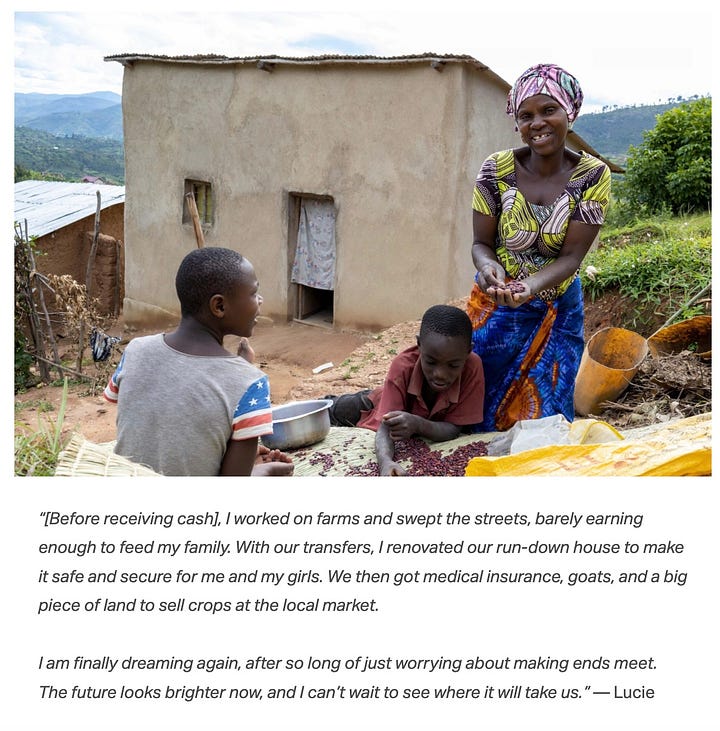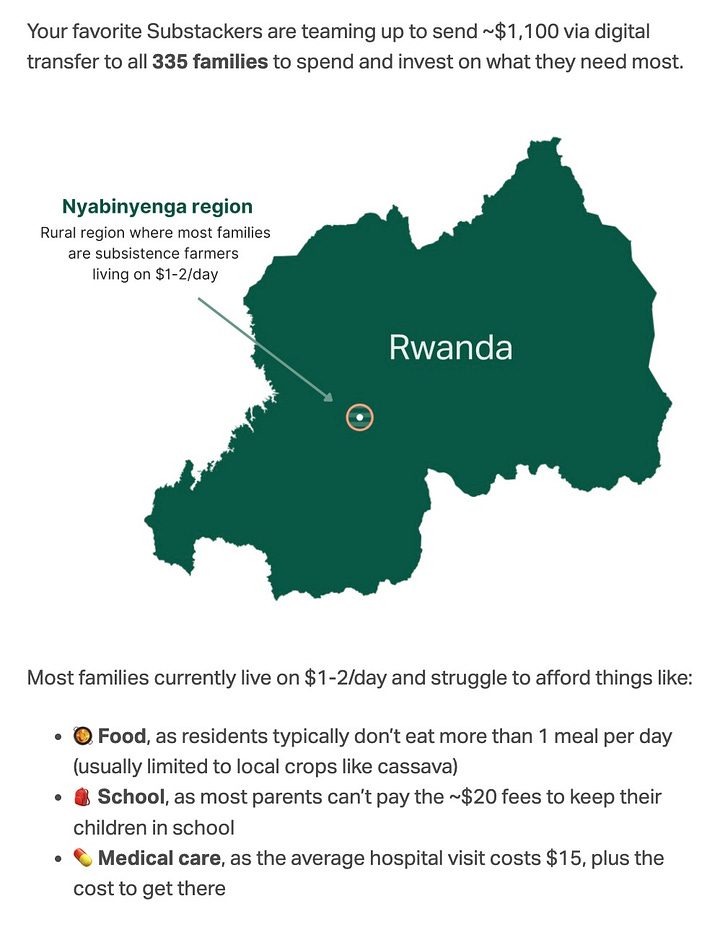It’s one thing to want to make a difference for people around the world whose life opportunities are deeply constrained by profound poverty. It’s another to have a direct path to doing so - albeit incrementally. As
has long, and convincingly, argued, direct cash transfers can help. Technology now makes this feasible, and the well-regarded nonprofit organization Givewell provides the interface.Yglesias and a batch of Substackers have a campaign set up to support a village in Rwanda, with a substantial matching opportunity today - Giving Tuesday. I’m chipping in today and hope you can, too. Here’s his top-line summary of the ask:
For those of you who prefer to skip straight to the ask, this Giving Tuesday, we’re inviting readers to join us, along with Nate Silver, Brian Beutler, Mikala Jamison, Rachel Cohen, Tim Lee, Joey Politano, and other writers in raising money to support cash transfers to people living on less than $2.15 per day. Donations will be matched up to $400,000.


Here’s an excerpt from Yglesias’s post explaining how, and why, this works:
[T]he rise of cell phones has enabled mobile payment systems in many countries around the world, including some countries that are incredibly poor and otherwise lack well-developed banking systems. It’s not available in every country, but GiveDirectly’s poverty relief programs have operated for years now in Kenya, Malawi, Mozambique, Rwanda and Uganda, with other cash transfer programs in Bangladesh, Democratic Republic of the Congo, Liberia, Nigeria, Morocco, Mozambique, and the US.
The way they run their poverty relief programs is that first they identify villages where the majority of the population is living on less than $2.15 per day, and then after explaining the program to everyone, they set up a transfer of approximately $1,000 to every household in the village with no strings attached.
There are obviously other ways you could think about doing this, but their method has a lot of advantages, like ensuring that you don’t provoke intra-village rivalry between those who receive the benefits and those who don’t. Ideally, of course, at some point we won’t have tons of villages that have so much systematic poverty that this works, at which point we’d need more sophisticated methods of identifying specific very poor people. For now, though, there’s unfortunately enough poverty that GiveDirectly is not running out of village-level targets.
And it works well! Meta-analysis shows a large majority of studies find positive impacts on monetary poverty and a preponderance of evidence showing improvements on savings, investment, and production.
Importantly, there are also studies looking at the question of whether one-off cash transfers reduce employment and education, which seems like the most plausible way cash transfers could backfire. But while there are some studies that find reductions in employment, three times as many find that employment increases (most show no result) and the evidence on education is even better. I don’t think we can necessarily promise a positive upward spiral of health gains, educational gains, and employment gains generating sustained long-term growth increases. But there are enough positive findings out here that indicate it’s at least possible with complementary good governance or good luck. Beyond that, though, I think the mechanical impacts on poverty are more than enough to make this a worthwhile cause.
Incremental but…
Yes, this is incremental. I’ve been in communities from the depths of Brazil’s Amazon rain forest to the periurban informal settlements of Nairobi to rural India where the same situation exists.
But the opportunity is concrete and consequential given the amplifying power of helping even one kid take a safer, more productive path to an empowered life.
Shanize Njeri Wanjiku, a 10-year-old poet I met and interviewed in 2016 in one of Nairobi’s poorest neighborhoods (a settlement largely composed of recent arrivals from even poorer rural regions), is just one example of the human potential that exists everywhere - when granted safety, nutrition and education:
Here’s the related Dot Earth post: A Girl from a Nairobi Slum Issues a Resonant Call for Post-Tribal Unity in Kenya.







Thanks for the support!